Related Research Articles
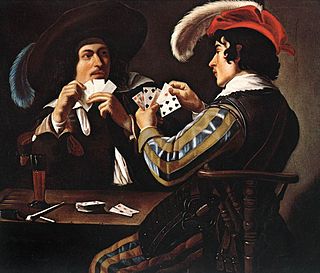
A card game is any game using playing cards as the primary device with which the game is played, be they traditional or game-specific. Countless card games exist, including families of related games. A small number of card games played with traditional decks have formally standardized rules with international tournaments being held, but most are folk games whose rules may vary by region, culture, location or from circle to circle.

Pinochle, also called pinocle or penuchle, is a trick-taking, Ace-Ten card game typically for two to four players and played with a 48-card deck. It is derived from the card game bezique; players score points by trick-taking and also by forming combinations of characters into melds. It is thus considered part of a "trick-and-meld" category which also includes the game belote. Each hand is played in three phases: bidding, melds, and tricks. The standard game today is called "partnership auction pinochle".
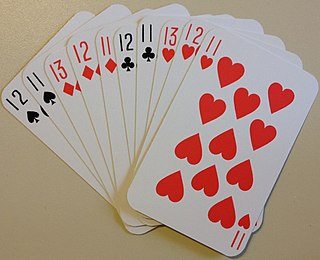
500 or Five Hundred is a trick-taking game developed in the United States from Euchre. Euchre was extended to a 10 card game with bidding and a Misere contract similar to Russian Preference, producing a good cut-throat three player game like Preference and a four player game played in partnerships like Whist which is the most popular modern form, although with special packs it can be played by up to six players.

Klondike, also known as Canfield, is a card game for one player and the best known and most popular version of the patience or solitaire family, as well as one of the most challenging in widespread play. It has spawned numerous variants including Batsford, Easthaven, King Albert, Thumb and Pouch, Somerset or Usk and Whitehead, as well as the American variants of the games, Agnes and Westcliff. The distinguishing feature of all variants is a triangular layout of the tableau, building in ascending sequence and packing in descending order.

Euchre or eucre is a trick-taking card game commonly played in Australia, Canada, Great Britain, New Zealand, and the Midwestern United States. It is played with a deck of 24, 28, or 32 standard playing cards. There are normally four players, two on each team, although there are variations for two to nine players.
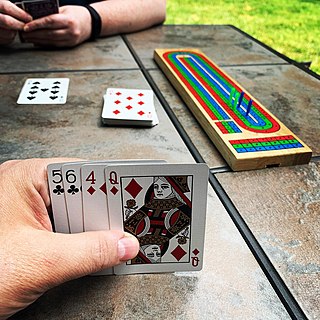
Cribbage, or crib, is a card game, traditionally for two players, that involves playing and grouping cards in combinations which gain points. It can be adapted for three or four players.

Brag is an 18th century British card game, and the British national representative of the vying or "bluffing" family of gambling games. It is a descendant of the Elizabethan game of Primero and one of the several ancestors to poker, the modern version just varying in betting style and hand rankings. It has been described as the "longest-standing British representative of the Poker family."

Spider is a type of patience game, and is one of the more popular two-deck solitaire games. The game originates in 1949, and its name comes from a spider's eight legs, referencing the eight foundation piles that must be filled to win the game.

Cassino, sometimes spelt Casino, is an English card game for two to four players using a standard, 52-card, French-suited pack. It is the only fishing game to have penetrated the English-speaking world. It is similar to the later Italian game of Scopa and is often said, without substantiation, to be of Italian origin. Cassino is still played today in Madeira, probably due to English influence.
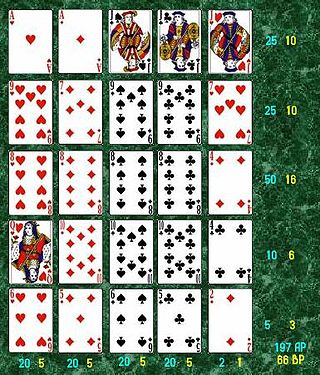
Poker Squares is a patience game with the objective of building the best poker hands using just 25 cards from the deck. It rewards both lucky guessing and accurate calculation of odds.
Aces Up is a quick and simple, one-pack, patience or solitaire card game.
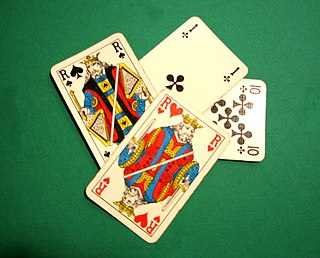
Clabber is a four-player card game played in southwestern Indiana near Evansville. It is a member of the Jack-Nine family of point-trick card games that are popular in Europe and is similar to Klaberjass. The trump makers must score at least eighty-two points to keep from "going set", where they don't score any of their points. Additional points can also be scored for a combination of cards in a hand, which would assist in "making it", or, not going set.
Cribbage Squares, occasionally Cribbage Square, is a patience or card solitaire based on Cribbage which can be played using a deck of playing cards. This game works the same way as Poker Squares, but with cribbage scoring.
Catch the Ten, also called Scots Whist or Scotch Whist, is an 18th-century point-trick, Ace-Ten card game which is recorded as being played only in Scotland, although evidence suggests a possible German origin. Unlike standard Whist, it is played with a pack of only 36 cards, the 5s and below being omitted. In the trump suit, the Jack is the highest card. Despite its alternative name, it has nothing to do with standard Whist.
Noddy also Noddie, Nodde or Knave Noddy, is a 16th-century English card game ancestor of Cribbage. It is the oldest identifiable card game with this gaming structure and thus probably also ancestral to the more-complicated 17th-century game of Costly Colours.
Three thirteen is a variation of the card game Rummy. It is an eleven-round game played with two or more players. It requires two decks of cards with the jokers removed. Like other Rummy games, once the hands are dealt, the remainder of the cards are placed face down on the table. The top card from the deck is flipped face up and put beside the deck to start the discard pile.
In cribbage, the probability and maximum and minimum score of each type of hand can be computed.
The rules here are based on those of the American Cribbage Congress and apply to two-, three- or four-player games, with details of variations being listed below.

Golf, also known as One Foundation, is a patience or solitaire card game where players try to earn the lowest number of points over the course of nine deals. It has a tableau of 35 face-up cards and a higher ratio of skill to luck than most other solitaire card games. Its easy game-play also makes it within easy reach of first-timers, while still offering scope for strategic play.
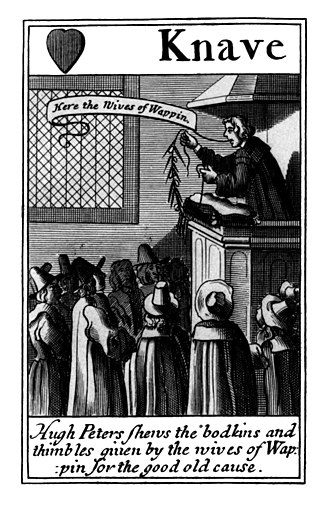
Costly Colours, sometimes just called Costly, is an historical English card game for two players and a "fascinating relative of Cribbage". The game "requires a moderate amount of skill in playing, and is well adapted to teach quickness in counting". It has more combinations than Cribbage and retains the original scoring system for points, but does not use a 'crib'. In the 19th century it was described as "peculiar to Shropshire."
References
- ↑ Card Games for One by Peter Arnold. ( ISBN 0-600-60727-5)
- ↑ "Cribbage Solitaire" (p.209) in Hoyle's Rules of Games (3rd edition) by Philip D. Morehead (ed.), 2001. ISBN 0-451-20484-0
- ↑ "Cribbage Solitaire" (p.29-30) in The Little Book of Solitaire, Running Press, 2002. ISBN 0-7624-1381-6